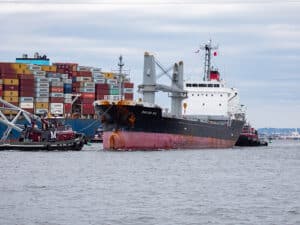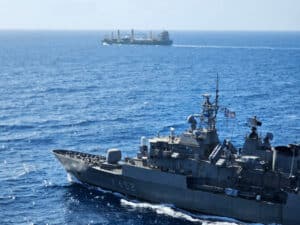
Houthi attacks continue, but don’t stop Red Sea trade
Written by Nick Blenkey
One vessel that did sustain damage in a Houthi attack, the Greek-owned bulker Zografia, was recently back on its way after repairs at the Suez Canal Authority’s Suez Shipyard Co. [Image: SCA]
Major strikes on Houthi infrastructure in Yemen carried out by the U.S. and U.K. on February 3, seemed to have brought a two day pause in the Iran-backed group’s attacks on merchant shipping, but by yesterday the attacks had resumed, continuing to have a dampening effect on Red Sea trade.
U.S. Central Command reported that six anti-ship ballistic missiles (ASBM) had been fired from Houthi-controlled areas of Yemen toward the Southern Red Sea and the Gulf of Aden. Three of the ASBMs were attempting to hit the Star Bulk bulker M/V Star Nasia, with one causing minor damage but no injuries The vessel remained seaworthy and is continuing toward its destination. Another three were likely targeting M/V Morning Tide, a Barbados-flagged, U.K.-owned cargo ship operating in the Southern Red Sea. The three missiles impacted the water near the ship without effect and it is continuing its journey, reporting no injuries or damage.
Though most Houthi attacks have been unsuccessful, some have caused damage, including the Greek-owned bulker Zografia, which subsequently underwent repairs at the Suez Canal Authority’s Suez Shipyard Co. And while no seafarers have thus been killed, a number of Houthis have been less fortunate.
IUMI CONTINUES TO SUPPORT RED SEA TRADE
Data on Suez Canal transits, a measurable indicator of Red Sea trade, show that the Houthi activity is, indeed, causing many shipowners to avoid the Canal, resulting in supply chain disruptions and rising shipping costs. Still, many operators are taking a calculated risk and are not diverting. And today, at its annual winter meeting in London, the International Union of Marine Insurance (IUMI) confirmed that the global marine insurance market is continuing to support trade both in the Red Sea and the Ukraine/Black Sea area.

“In the Red Sea, the insurance market is providing hull and cargo products at affordable prices and vessel owners are able to obtain the cover they require,” says IUMI. “The attacks are continuing despite military intervention but, fortunately, vessel casualties have not been catastrophic. The impact on Suez Canal transits and global supply chains are significant but this has not affected the ability of the marine insurance market to provide adequate cover – both for Red Sea/Suez Canal transits or for the longer route around the Cape of Good Hope.“
WAR RISKS
While the insurance market may be continuing to provide hull and cargo products at affordable prices, when it comes to war risk insurance it looks like the story is different when it comes to vessels with U.S., U.K. and Israeli links, all of which have been specifically identified as targets by the Houthis. The Reuters news agency today reported market sources as saying that owners of vessels in those categories “are now paying 25-50% more in war risk premium than other ships to navigate the Red Sea.”




